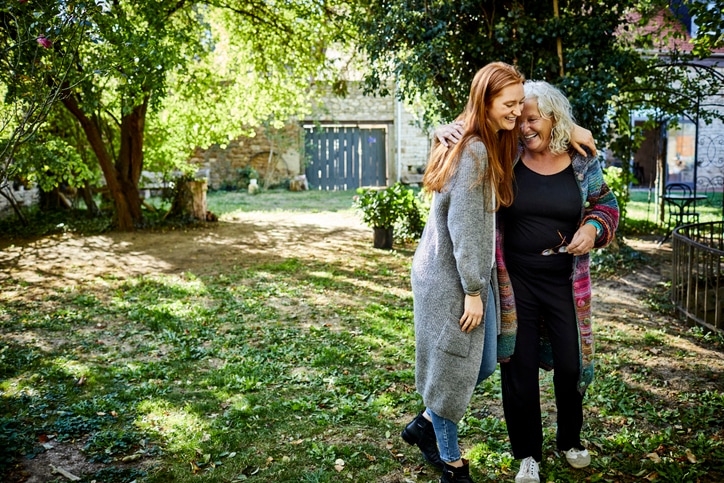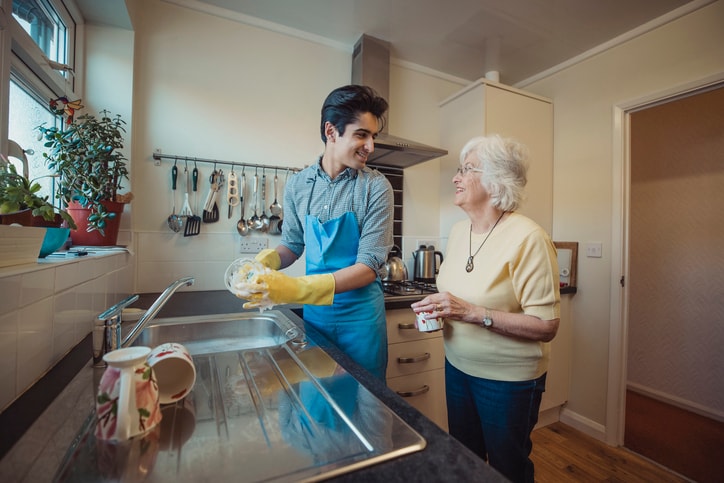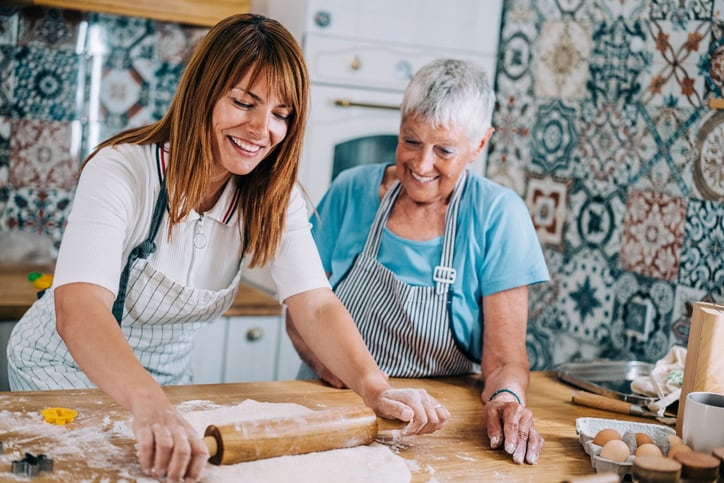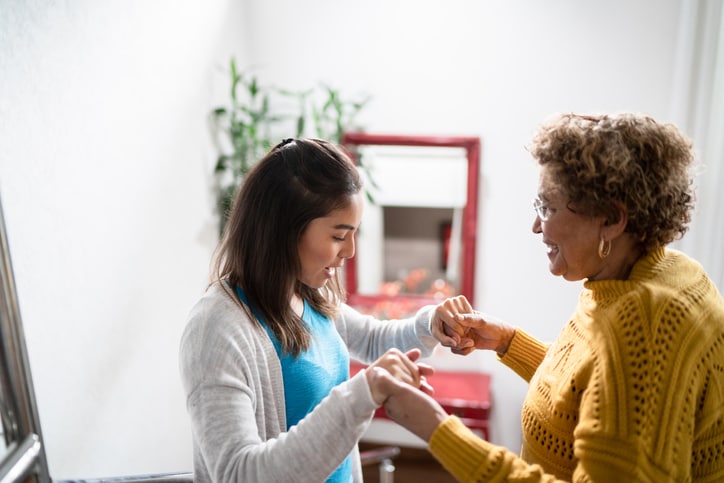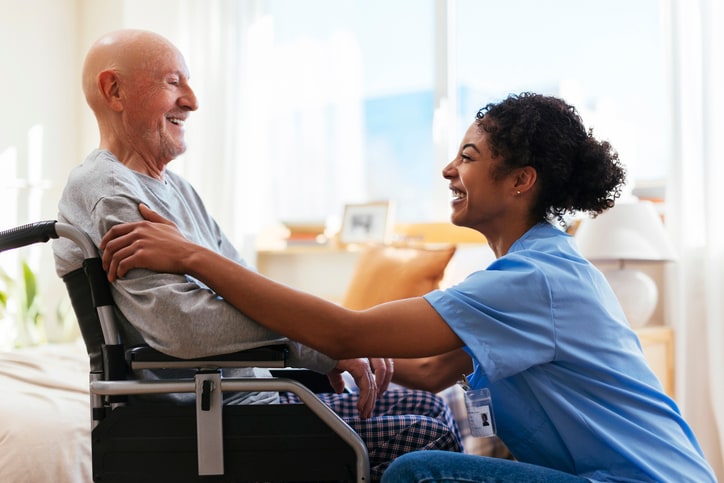Caring for an older adult as a professional caregiver or family member is uniquely taxing work, which is why finding support should be nonnegotiable.
“While caregiving can be a deeply rewarding experience, it can also take a significant toll on your mental and emotional well-being,” notes Neal Shah, founder and CEO of CareYaya. “Joining a support group can be incredibly beneficial for senior caregivers. These groups provide a safe space to connect with others who understand the unique challenges of caregiving, share experiences and coping strategies and find emotional support.”
Here, Shah and others explain the importance of support groups for caregivers, as well as provide caregiver support group options and more.
The benefits of support groups for caregivers
For stressed caregivers, referral to a support group is the “first-line intervention” for Dr. Rehan Aziz, a geriatric psychiatrist at Jersey Shore University Medical Center, as they allow caregivers to “share experiences, receive emotional support and learn from others in similar situations.”
Finding help in the form of a support group is a healthy “coping mechanism,” notes John Lee, assistant chief clinical officer at Executive Mental Health in Los Angeles. “When caregivers are constantly confronted with negative stressors without a fixed endpoint in sight, it can lead to fear, anxiety and even an underlying sentiment of a lack of control.”
“When you reach out to a support group, you can gain back a sense of understanding, awareness and acceptance,” he continues, adding that support groups can positively affect both you and the person for whom you’re caring.
Support groups for caregivers
Here, check out our list of expert-recommended caregiver support groups for a variety of situations and circumstances.
Online support groups
Here’s where to find support any place, any time from the comfort of your own home.
1. Caregiver Action Network
The Caregiver Action Network, or CAN, works to help those who care for loved ones with chronic conditions, disabilities or disease, as well as those supporting the living needs of older adults. “The website includes an extensive toolbox, as well as a Caregiver Help Desk, staffed by caregiving experts who offer free support to family caregivers,” notes Aziz.
Caregiver Help Desk phone number: 202-454-3970
2. The Caregiver Space Community
The 8,000+ members of the The Caregiver Space Community Facebook group, by TheCaregiverSpace.org, a nonprofit for caregivers, get encouragement and support in their daily trials. Anyone providing care to folks that are older, ill or disabled will find helpful resources. Both family and professionals are encouraged to participate.
3. The Well Spouse Association
The Well Spouse Association offers support to spousal caregivers. In addition to offering in-person group meetings (broken down by state in their search tool), The Well Spouse Association offers online support in the form of an online forum on their site, Facebook groups, Reddit forums and more.
4. Family Caregiver Alliance
The Family Caregiver Alliance (FCA) “provides extensive resources and support for caregivers of adults with chronic or disabling health conditions,” notes Aziz. Their online caregiver support groups focus on family caregivers. Additionally, they have an interactive tool, which provides a wide variety of links to resources for caregivers in all 50 states.
5. The Alzheimer’s Association
One of Thomas’s favorite caregiver support groups is the Alzheimer’s Association. They have both expert-run virtual groups, as well as online forums. “They offer emotional support, share useful advice and provide resources to help manage caregiving duties,” notes Thomas.
6. r/CaregiverSupport and r/Caregiving via Reddit
When in-person meetings aren’t possible, Dana Eble, public relations and outreach manager at the Alzheimer’s Caregivers Network, is a fan of the subreddits r/CaregiverSupport and r/Caregiving. “Both of these online spaces are welcoming and nonjudgmental,” she explains. “Some people feel better posting online than sharing these feelings in person, but whatever your preference is, it’s important to have an outlet and find a space that works for you.”
7. The American Cancer Society
For anyone caring for someone who’s been diagnosed with cancer, Shah recommends the American Cancer Society, which recently created ACS CARES, an app that connects caregivers with resources, trained community members, as well as direct access to cancer information specialists.
8. Working Daughter
With over 9,000 members, Working Daughter is a Facebook group specially designed for women with careers who are also balancing the demands of caring for a relative. Whether you are helping an older family member or someone younger with special needs, the community here is unique in that it understands the roles of work and care. This group is a project of the WorkingDaughter.com website.
9. AARP Family Caregivers Facebook group
The AARP Family Caregivers Discussion Group is a private Facebook group caregivers can join in order to connect with others in similar situations. Created in 2019, the group currently has over 19,000 members that share tips, offer support and more.
In-person caregiver support groups
For face-to-face and over-the-phone caregiver support, consider the following groups.
10. Eldercare Locator
Another caregiver support group Aziz recommends is Eldercare Locator, which is a public service of the Administration for Community Living. “They connect services to older adults and their families,” he says. “The website has a Caregiver Corner with useful links and resources.”
11. VA Caregiver Support
For those who are working within the Veterans Affairs (VA) system to get help for their loved one, the VA offers caregiver support coordinators at each VA Medical Center to help caregivers find the right support to meet their needs and to enroll in caregiver programs and services. You can also check out the VA’s National Caregiver Support Line (CSL) — 1-855-260-3274 — which serves as a primary resource/referral center to assist caregivers, veterans and others seeking caregiver information.
12. Mental Health America
Whether the person you care for has ongoing mental health challenges or a sudden episode of depression or anxiety, or you have found the caregiving role to be a burden on your mental health, there is support available. The Mental Health America network can put you in touch with someone to assist either you or your loved one. They also have an affiliate network standing by to get you the assistance you need.
13. Alzheimer’s and Dementia Caregiver Center
Looking for information and support specific to caring for a loved one with Alzheimer’s or dementia? The Alzheimer’s Association’s map feature will help you locate the resource group nearest you, which is staffed by trained professionals. Support groups specifically designed for those with early stages of these diseases are offered separately from those who are in the later stages.
14. ARCH National Respite Network and Research Center
Caregivers who need respite care or information on how to become eligible for funded care can connect to ARCH National Respite Network and Research Center, free of charge. Included in the support tools is a National Respite Locator Service, which also provides information for each of the 50 states’ respite agencies.
15. Local resources
For folks looking to connect in person, Eble suggests speaking with your loved one’s or client’s doctor for recommendations. “Many support groups meet at hospitals, libraries, community centers and places of worship,” she explains. “You can also ask on your community’s Facebook pages to see if anyone has recommendations.”
16. Friends and family
While support groups of any kind are incredibly helpful, Lee notes it’s important not to forget about your natural support group — your family and friends.
“Caregivers should remember to keep in touch with friends, families and other circles of support,” he says. “Being intentional about maintaining positive contact with your support system is vital, whether it’s by meeting up or simply calling to check in.”
Why is senior caregiving so taxing?
All forms of caregiving are taxing, but providing care to older adults is unique in that there’s an element of grief. “We call this ‘anticipatory grief,’” explains Eble. “It’s the feeling of mourning someone who is still alive. It often robs caregivers of good and happy moments with their loved one because they’re worried about what will happen in the future.”
Eble also notes that, for family caregivers, relationship issues can be exacerbated. “Not everyone has a picturesque relationship with their parents or family,” she says. “Caregiving has a tendency to magnify existing tensions and problems in relationships.”
Other factors that contribute to caregiver strain, per Aziz, are:
Physical demands. Care tasks can be physically strenuous, especially when an older adult has mobility issues.
Emotional tolls. Continuous care for older adults with chronic illnesses or dementia can be emotionally draining, especially for those who have no respite or relief.
Isolation. Many caregivers give up their own hobbies or outings with friends/family due to obligations.
Financial strain. Caregiving, in many cases, is unpaid work. “It can create further financial burdens,” Aziz explains, “due to reduced working hours or missing time from work, as caregivers, likely as a result of stress, are more prone to sickness themselves.”
Signs it’s time to find seek support
According to Aziz, caregivers should seek help at the first sign of any symptoms of burnout syndrome, which has four dimensions, including:
1. Emotional exhaustion, including overwhelming fatigue, increased irritability, or anger or withdrawal from activities
2. Depersonalization, which is feeling indifferent, impersonal and even cynical towards the person for whom you’re providing care.
3. Reduction of personal fulfillment, where you perceive the care you’re providing as negative or ineffective.
4. Physical symptoms, such as headaches, stomachaches, difficulty falling or staying asleep or other stress related physical issues.
If you feel any of the symptoms, Aziz recommends the following:
- Speaking with a therapist.
- Routinely seeing your primary caregiver.
- Exercising and eating healthy.
- Eating healthy.
- Employing relaxation techniques, such as mindfulness-based stress reduction (MBSR).
- Taking breaks, particularly in the form of respite care.
- Finding a support group.
The bottom line
If you’re a senior caregiver struggling with the challenges of your role, it’s important to know you’re not alone. “Reaching out for help is a sign of strength, not weakness,” Shah says. “Using available resources will help you navigate your journey with greater ease and resilience. Remember, taking care of yourself is not selfish — it’s essential to providing the best possible care for your loved one.”

